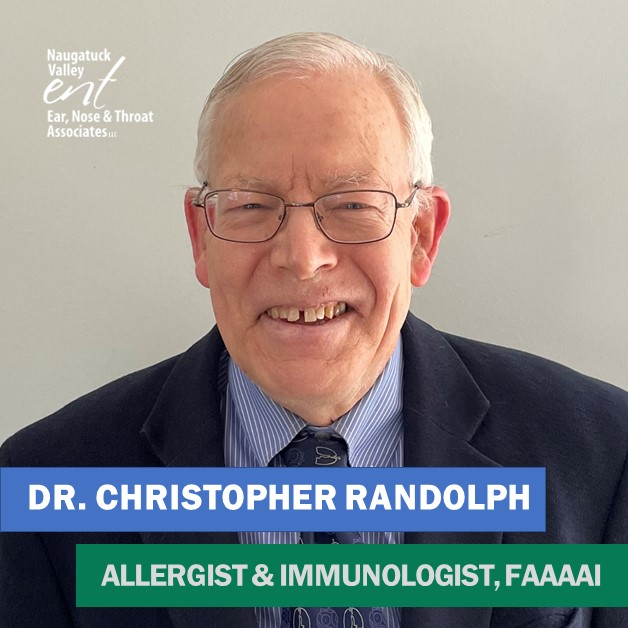Allergy Services for Allergy Sufferers in the Waterbury, CT Area
Allergies are a common condition affecting millions of people worldwide, especially here in the Waterbury, CT area. Allergies can cause various symptoms, from mild discomfort to life-threatening reactions. As an ENT office, we see many patients who suffer from allergies and want to help educate our community on our allergy services and explain about allergies. If you think you may have allergies, it is crucial to seek medical attention to receive a proper diagnosis and treatment plan. We are committed to providing our patients with the highest quality care for all their allergy-related needs.
Our Allergy specialist is Dr. Christopher Randolph, who recently joined our practice and now accepts patients. He brings 37 years of of Allergy, Asthma and Immunology experience in private practice and is a Clinical Professor at Yale in Allergy/Immunology. Dr. Randolph is nationally recognized expert on sports or exercise related asthma. He can help patients with the following ailments.
- Asthma, especially exercise or sports-related asthma
- Atopic dermatitis
- Drug Allergies
- Environmental & Seasonal Allergies
- Eosinophilic esophagitis identified by GI needing Dupixent or allergy evaluation
- Food Allergies
- Immunodeficiency
What are allergies?
Allergies are an individual’s immune response to a typically harmless substance, such as pollen, dust, or certain foods. When someone with allergies encounters an allergen, their body produces an antibody called immunoglobulin E (IgE) which triggers the release of histamine and other chemicals. This defense response can cause various symptoms depending on the type and severity of the allergy.
Types of allergies
There are several types of allergies, including:
- Seasonal allergies, also known as environmental allergies or hay fever, are caused by exposure to pollen from trees, grasses, and weeds during certain times of the year.
- Food allergies occur when the immune system reacts to certain foods, such as nuts, shellfish, and dairy products.
- Drug allergies are a reaction to medication and can range from mild to life-threatening.
- Insect allergies occur when someone is stung or bitten by an insect such as a bee or wasp.
- Contact allergies are reactions to a substance that encounters the skin, such as poison ivy or latex.
Additionally, many allergies can exacerbate asthma, especially for individuals playing sports.
Symptoms of allergies
The symptoms of allergies can vary depending on the type and severity of the allergy. Common symptoms include:
- Sneezing
- Runny or stuffy nose
- Itchy or watery eyes
- Rash or hives
- Swelling of the face, lips, or tongue
- Difficulty breathing or wheezing
- Nausea or vomiting
- Severe allergic reactions, also known as anaphylaxis, can cause life-threatening symptoms such as difficulty breathing, a rapid heartbeat, and loss of consciousness.
Causes of Season Allergies in Connecticut
The Waterbury area and across Connecticut are known for beautiful landscapes and diverse flora, but unfortunately, some of these plants can trigger seasonal allergies. Here are some common trees, bushes, and plants that cause seasonal allergies in Connecticut:
- Oak trees: Oak trees are common in Connecticut and can produce a large amount of pollen, triggering allergic reactions in some people.
- Maple trees: Maple trees are also common in the state and can produce a significant amount of pollen in the spring and fall.
- Birch trees: Birch trees are another common allergen, with their pollen season typically occurring in the spring.
- Ragweed: Ragweed is a weed and a significant cause of seasonal allergies, especially in the late summer and fall.
- Grasses: Many grasses, such as Timothy grass and bluegrass, can also trigger seasonal allergies here in the Nutmeg state.
- Poison ivy: Poison ivy is a common plant that can cause an allergic reaction in some people when they come into contact with its oils.
- Forsythia: Forsythia bushes are a common ornamental plant, but their bright yellow flowers can produce significant pollen.
- Privet: Privet bushes are often used as hedges, but they can produce significant amounts of pollen in the spring.
- Juniper: Juniper bushes are a popular landscaping choice in Connecticut, but their pollen can cause allergic reactions in some people.
- Goldenrod: Goldenrod is a flowering plant that grows throughout the state and can produce significant amounts of pollen in the late summer and fall.
It is important to note that not everyone will react to these plants, and the severity of allergic reactions can vary. If you are experiencing seasonal allergy symptoms, it is recommended to consult with an allergist or ENT specialist to determine the cause and develop an appropriate treatment plan.
Season Allergy Treatments
Seasonal allergies can cause various symptoms, such as sneezing, runny nose, itchy eyes, and congestion. Fortunately, there are several types of medications available that can help relieve these symptoms. Here are some common medications used to treat seasonal allergies:
- Antihistamines: Antihistamines are a type of medication that blocks the effects of histamine, a chemical released by the body in response to allergens. They can help relieve symptoms such as sneezing, itching, and runny nose. Some examples of over-the-counter antihistamines include loratadine (Claritin), cetirizine (Zyrtec), and fexofenadine (Allegra).
- Decongestants: Decongestants help relieve nasal congestion by narrowing blood vessels in the nasal passages. They can be found in both oral and nasal spray forms, and some examples include pseudoephedrine (Sudafed) and oxymetazoline (Afrin). It is important to note that decongestant nasal sprays should not be used for more than a few days, as they can lead to rebound congestion.
- Nasal corticosteroids: Nasal corticosteroids are a type of medication that can help reduce inflammation in the nasal passages, alleviating symptoms such as congestion, runny nose, and sneezing. Examples include fluticasone (Flonase), budesonide (Rhinocort), and mometasone (Nasonex).
- Mast cell stabilizers: Mast cell stabilizers prevent the release of histamine and other inflammatory chemicals involved in allergic reactions. They are often used as a preventive measure rather than to treat symptoms after starting. Some examples include cromolyn sodium (NasalCrom) and nedocromil (Alocril).
- Combination medications: Some medications combine antihistamines and decongestants, such as loratadine-pseudoephedrine (Claritin-D) or cetirizine-pseudoephedrine (Zyrtec-D). These can provide relief for both nasal congestion and other allergy symptoms.
It is essential to talk to your healthcare provider before starting any new medications, especially if you have any underlying medical conditions or are taking other medications. They can help determine which medication best suits your needs and guide you on using them safely and effectively.
Advanced Allergy Treatments
The best way to manage allergies is to avoid the allergen that triggers the reaction. This may involve lifestyle changes such as avoiding certain foods or staying indoors during peak pollen season. Recent advances in treating allergies have focused on developing new therapies to provide more targeted and effective relief for allergy sufferers. Here are some of the most promising advancements:
- Biologic therapies: Biologic therapies are a type of medication that target specific molecules in the immune system, reducing the body’s response to allergens. One example is omalizumab, which treats severe asthma and allergies by targeting IgE antibodies involved in allergic reactions.
- Sublingual immunotherapy: Sublingual immunotherapy (SLIT) involves placing drops or tablets containing small amounts of allergens under the tongue to desensitize the immune system over time. It is a safe and effective alternative to traditional allergy shots requiring injections.
- Food immunotherapy: Food immunotherapy involves gradually exposing individuals to small amounts of the food they are allergic to, to build up tolerance over time. This treatment has shown promise in treating peanut and milk allergies.
- Allergen-specific immunoglobulin therapy: Allergen-specific immunoglobulin therapy (ASIT) is a new approach to treating allergies that involves injecting small amounts of allergen-specific antibodies directly into the bloodstream. This treatment has shown promise in treating pollen and dust mite allergies.
- Gene therapy: Gene therapy is a promising new approach to treating allergies that involves modifying the genes responsible for the immune response to allergens. While still in the early stages of development, this approach could provide a long-term cure for allergies.
In addition to these advancements, researchers are also exploring using artificial intelligence and machine learning to predict better and diagnose allergies and to develop more personalized treatment plans for individual patients. Overall, these advancements in allergy treatment offer hope for those suffering from allergies and may lead to more effective and targeted therapies in the future.
If you are suffering from any allergies or asthma, please get in touch with Naugatuck Valley ENT at (203) 578-4630 to set up an appointment.
If you are suffering from any allergies or asthma, please get in touch with Naugatuck Valley ENT at (203) 578-4630 to set up an appointment.





